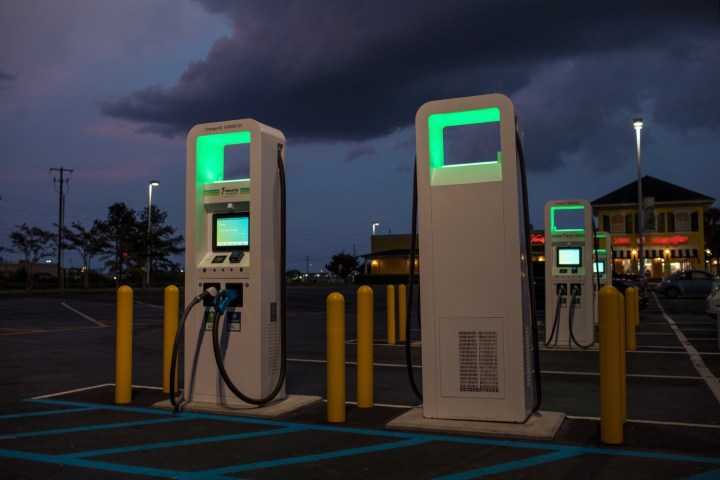As we head into a world of electric cars, charging is the biggest concern for many first-time buyers. It makes sense. While the hype for electric cars themselves is arguably justified, the biggest drawback is the fact that you have to charge them, and right now, that can be a bit of a hassle.
That’s not only because of the fact that you have to wait to charge — but also because of the fact that there are different types of electric car chargers, and you may not be able to charge an electric car with all of those different types.
Need a rundown? Here’s a look at the different types of electric car chargers.
Electric car charging speed types

There are three primary types of electric car charger speeds. They are often referred to as Level 1, Level 2, and Level 3 chargers. Here’s an overview of each type.
Level 1
Level 1 chargers use a standard 120-volt AC household outlet and provide charging through a vehicle’s onboard charger. They typically deliver 2 to 3 miles of range per hour of charging, making them suitable for overnight charging or for plug-in hybrid electric vehicles (PHEVs) with smaller battery capacities. Level 1 charging is the slowest method of charging an electric vehicle (EV) but doesn’t require any special charging equipment beyond the charging cable supplied with the vehicle. If you lose it or want to upgrade, our guide to charging an EV at home includes some options with perks like longer cables and faster charging speeds.
Level 2
Level 2 chargers use a 240-volt AC power source, similar to what is used for large household appliances like electric dryers. They are significantly faster than Level 1 chargers, providing 10 to 60 miles of range per hour of charging, depending on the vehicle and charger specifications. Level 2 chargers are commonly found in residential, workplace, and public charging stations, which you can find with the best apps for finding car charging stations.
Level 3
Level 3 chargers, also known as DC Fast Chargers (DCFC) or rapid chargers, provide direct current (DC) charging at much higher power levels than Level 1 or Level 2 chargers. They can charge an EV up to 80% capacity in just 20 to 60 minutes, depending on the vehicle’s battery capacity and the charger’s power output. These chargers are commonly found along highways and in urban areas for longer trips or quick top-ups. If you’re wondering how much it costs to recharge an electric car at one of these stations, it varies significantly, but $20 to $30 is a reasonable estimate for many cars in many situations. Due to the power required, installing one at home isn’t an option.
Electric car charger plug types

On top of the different types of charging speeds, there are also different car charger connectors. Here’s a look at the different connector types in North America.
SAE J1772
This plug type is primarily used for Level 1 and Level 2 AC charging in North America. It is the standard connector for most electric vehicles (except for Tesla) and charging stations in the United States and Canada. If you have an EV that’s not a Tesla, in North America, it likely supports this charging standard.
CCS (Combined Charging System)
The CCS plug is an extension of the SAE J1772 connector, with two additional DC pins for fast charging. CCS is backed by many major automakers, including BMW, Volkswagen, General Motors, Ford, and others. It is becoming the standard for DC fast charging in North America and Europe — so if you have a non-Tesla that supports DC fast charging, like the Kia EV6 GT, it most likely has a CCS connector.
CHAdeMO
CHAdeMO is a DC fast charging standard developed in Japan and used by several automakers, including Nissan, Mitsubishi, and Kia. The CHAdeMO plug enables rapid charging for compatible electric vehicles, primarily in Japan, the United States, and some European countries. It’s relatively uncommon, which can make it a strike against the few vehicles that use it, like Mitsubishi’s 2023 Outlander PHEV.
Tesla Proprietary Connector
Tesla uses its own proprietary connector for both AC and DC charging at its Supercharger network stations and Tesla Destination Chargers. In North America, Tesla vehicles come with this unique connector, while in Europe, they use a modified connector that is compatible with Tesla Superchargers and public charging stations.
Editors' Recommendations
- Here’s how EVs charge as they drive on a stretch of Michigan road
- Mercedes G580 electrifies an off-road icon
- The 10 best car battery brands in 2024
- Best electric car charger deals: $100 off home charging stations
- 2025 Mercedes-Benz EQS sedan gets new face, bigger battery


